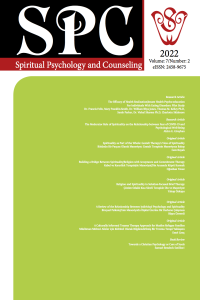Articles
Research
Book Review
Aim & Scope
Spiritual Psychology and Counseling (SPC) is an international peer-reviewed scientific journal for the publication of research and studies covering all aspects of spirituality and spirituality-related issues within the context of psychological processes. Culturally sensitive counseling theories and practices are also covered by the journal.
The scope of the journal encompasses research topics that fall within the broad range of spirituality such as spiritual constructs, spiritually oriented and culturally sensitive psychotherapy and counseling interventions, psychological inquiry on all spiritual traditions all over the world. The journal’s vision is to stimulate and facilitate national, international, and interdisciplinary scientific communication, to strengthen the links between scientific research, theory and practice on its area. SPC is aimed to serve as an interdisciplinary forum for the exchange of recent empirical research and scholarly contributions adhering to international standards on scientific methodology and scholarly presentation of scientific contributions.
Spiritual Psychology and Counseling editorial board consider several qualities that can increase the chance that a manuscript could be evaluated favorably: (1) The remarkable conceptual contribution of the paper. (2) Clear understanding of how literature critically relates to the topic studied. (3) The research presented is systematically as well as being methodologically and conceptually innovative. (4) The methods are sophisticated and include measures in addition to self-reporting. (5) Critical recommendations for further research, theory and practice in national and international contexts.
Spiritual Psychology and Counseling publishes peer-reviewed research reports, theoretical papers and book reviews on spiritual psychology and counseling, bringing together research conducted within a variety of different disciplines. Articles include theoretical and empirical research papers; case reports and historical research related to issues within the scope of spiritual psychology and counseling.
Writing Rules
Ethical Principles and Publication Policy
Human Participants
Our Editorial Board adopts the Declaration of Helsinki (https://www.wma.net/policies-post/wma-declaration-of-helsinki-ethical-principles-for-medical-research-involving-human-subjects/), which can be defined as the standard with the largest consensus regarding human participants. Protecting the participants from any harm is the most important basic principle. Participants or their legal representatives must have voluntarily participated in the research. Informed consent should be obtained, and if some information was hidden from the participants for research purposes, the reasons for this should be clearly stated.It is essential that the participant information be anonymous, in cases where it is necessary to reveal the photographs or identities of the participants, their written consent must be found and submitted to the editors.
Ethics committee approval or other equivalent registration must be obtained for studies using human participant data sent to be published in SPC, this approval must be stated and documented in the article. These articles should include the statement regarding the compliance with Research and Publication Ethics and the information of the relevant ethics committee decision.
Plagiarism and Other Misconduct
All manuscripts submitted to SPC are checked by a leading commercial online plagiarism detection software package. Similarity analysis reports are evaluated by the handling editor. If the similarity analysis indicates plagiarism or any similar misconducts with respect to publication ethics (self-plagiarism, duplication or redundant publication etc.); manuscripts are rejected without being considered for further review processes.In some cases, there can be instances of plagiarism which cannot be detected by the software packages such as in translated pieces. SPC reviewers are required to report these kind of infringements to the respective editor. If there is a detection of plagiarism in already published SPC articles; SPC editorial board may take necessary measures by adherence to the international ethical standards of Publication Manual of American Psychological Association (APA Style; 7th edition) and “COPE Code of Conduct and Best Practice Guidelines for Journal Editors” (https://publicationethics.org/files/Code_of_conduct_for_journal_editors_Mar11.pdf).
In the evaluation process, many violations other than plagiarism can be encountered. Our Editors are obliged to follow the concrete procedures clearly defined in the flow charts by COPE (Committee on Publication Ethics) in cases such as guest authoring, unfair representation of the authors, and suspicion of manipulation in the referee process (https://publicationethics.org/guidance/Flowcharts). The principles and standards outlined in the COPE “Guidelines for Behavior and Best Practice for Journal Editors” are binding on the SPC Editors and the reviewers involved in the review processes.
Other Notes
Manuscripts based on thesis-related research should include all data used in the thesis. SPC does not publish any article including unethical practices such as sliding.Manuscripts with content that is previously presented as an abstract or poster in a professional meeting or conference are acceptable for review in SPC, provided that this fact is openly stated as a footnote.
SPC editorial believe that the data collection process for original research should have been done in the last 5 years.
Price Policy
No fee is charged from the authors at any stage during the SPC Journal processes.

